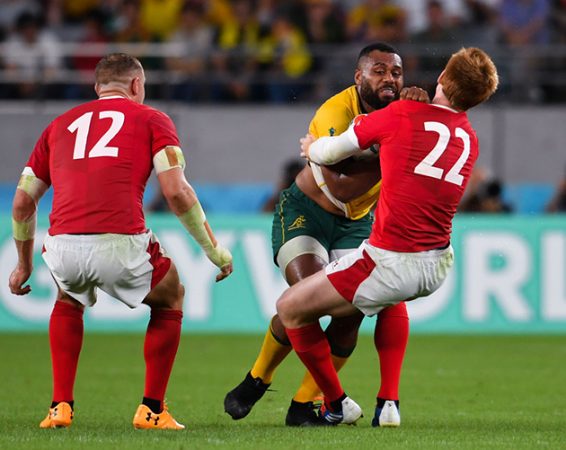The Samu Kerevi-Rhys Patchell incident is the latest tackle controversy to mar the Rugby World Cup
Michael Cheika: “I don’t know the rules anymore”
There may not have been any cards or calls for citings during Wales’ World Cup win over Australia, but there was still plenty of controversy.
It all centred around a collision between Samu Kerevi and Rhys Patchell. Wales’ replacement fly-half was very upright going into the tackle – poor technique it has to be said – and was knocked backwards by the force of the Wallaby centre’s run.
Some could make a case for Patchell’s tackle being reviewed for being high, but the TMO raised the dangerous element of Kerevi leading with his forearm, which rose up to connect with Patchell’s throat. Reckless was the verdict and a penalty for Wales.
Match report: Australia 25-29 Wales
The exchange between referee Romain Poite and Australia captain Michael Hooper, as well as Kerevi, was interesting. Hooper flagged Patchell’s poor technique and asked how Kerevi was supposed to carry with the ball. Tucking in his arm seemed to be the advice, but the Wallabies were clearly still frustrated by the decision post-match.
Hooper said: “I don’t know how to carry into a player, as a player who is trying to make a dominant carry. And he (Patchell) used poor tackle technique and has fallen back. I don’t know what Kerevi could have done.”
Kerevi himself was just as flummoxed: “The way rugby is going, I might as well join the NRL next seeing as how they police it. Look, it’s a hard decision for the referees. I guess I’ve got to change the technique, the way I run.
“I’ve been playing like that my whole career and that’s the first time I’ve heard that I can’t lead with my arms and bump.
“It’s hard when you slow it down to one-tenth of a second. It looks like I’m going for his neck, but there’s no malice in it.
“What do we do in that split-second? With the force I’m coming at, and if he’s going backwards and I can’t move forward, I might as well just stop. I guess I’ve got to use more feet and not run straight anymore.”
Related: World Rugby criticises World Cup referees
Australia coach Michael Cheika went as far as to say he was “embarrassed” by the decision and that he no longer understood the game’s laws. Australia wing Reece Hodge was banned for three matches earlier this week for his tackle on Fiji’s Peceli Yato and Cheika believes Patchell’s tackle on Kerevi was similar.
“It was pretty funny because I thought I had seen that tackle before, it could have been Reece Hodge, I am not sure,” said Cheika, with more than a hint of sarcasm. “When our guy makes that tackle and has the high tackle framework in his head, he gets suspended. This guy doesn’t think about the high tackle framework and we get penalised.
“As a rugby player, a former player, I am embarrassed here. I honestly don’t know the rules anymore.”
Hodge banned for three weeks after tackle on Fiji's Yato
Do you agree with the decision? ?https://t.co/cAHRQB0k3R pic.twitter.com/eUJOrb3eoe
— ITV Rugby (@ITVRugby) September 25, 2019
Cheika believes rugby has gone too far in the current regulations and that officials are scared of making the wrong decision. He added: “You’ve got to look after players, but not to the extreme where you are looking after the players just for the doctors and lawyers. You’ve got to look after the players for the players.
“They all seem spooked. Everybody seems worried. I am not sure why they are worried, the players aren’t worried. Then it’s affecting everything else on the field, with decisions on all types of crazy stuff.
“Maybe the administrators are spooking the referees. The referees are worried about making wrong decisions and become ultra-cautious.”
The high tackle rulings look set to continue to dominate conversations around this World Cup. There have now been two red cards for dangerous tackles and three three-week bans from citings. Even Piers Francis escaping a ban because his tackle on Will Hooley was deemed a yellow card offence has caused debate.
If you’re unsure of the High Tackle Sanction Framework – as it is snappily known – this flowchart should help explain the process referees and officials are supposed to go through for high tackles…
With the #RWC2019 warm-up matches well underway, here is all you need to know about the high tackle sanction framework & why it is important to protecting the long-term health of players (video included) https://t.co/4CdvBGKYdW pic.twitter.com/YwOjdUl4gH
— dominic rumbles (@dominicrumbles) August 23, 2019
Amidst all the debate and controversy, it’s important to remember that this has been brought in for player welfare reasons and primarily to reduce the risk of concussions.
We asked Wales wing George North if he was concerned about the increased focus on high tackles and he said: “I’m not worried. We’ve all been briefed and we all know the rules. It can be frustrating sometimes but we all buy into it.”
After all, the aim is to improve player safety.
Keep updated on what’s happening in Japan at our Rugby World Cup homepage.
Follow Rugby World magazine on Facebook, Instagram and Twitter.





